

Margaret Thatcher and the Crumbling Case for Austerity Economics. The gods have a dark sense of humor, it would seem.
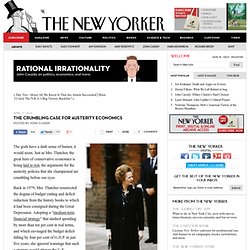
Just as Mrs. Thatcher, the great hero of conservative economics is being laid to rest, the arguments for the austerity policies that she championed are crumbling before our eyes. Back in 1979, Mrs. Thatcher resurrected the dogma of budget cutting and deficit reduction from the history books to which it had been consigned during the Great Depression. Adopting a “medium-term financial strategy” that slashed spending by more than ten per cent in real terms, and which envisaged the budget deficit falling by four per cent of G.D.P. in just five years, she ignored warnings that such a strategy would plunge the U.K. economy into a deep recession, which it did.
All these years later, on the very eve of the Thatcher funeral, comes Olivier Blanchard, the chief economist of the International Monetary Fund, casting aside the hair shirt that usually comes with his job and warning Mrs. Since then, though, things have changed. Mankiw to the Rescue (of the 1%) Apparently, when Greg Mankiw isn’t smugly referencing his own textbook on his blog, where criticism comments are banned, he finds time to write papers on the most important political issues of our time.
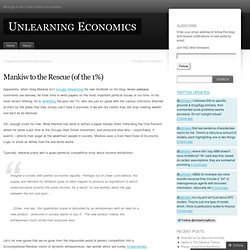
In his most recent offering, he is defending the poor old 1%, who are just so upset with the various criticisms directed at them by the plebs that they simply can’t take it anymore. If we are not careful they will stop creating wealth and we’ll all be doomed. OK, enough snark for now. What Mankiw has done is written a paper literally titled ‘Defending the One Percent’, where he takes a pot shot at the Occupy Wall Street movement, and everyone else who – unjustifiably, it seems – directs their anger at the wealthiest people in society. Mankiw uses a Cold Hard Dose of Economic Logic to show us lefties how the real world works. Typically, Mankiw starts with a quasi-perfectly competitive story about income distribution: Imagine a society with perfect economic equality.
Lynn Parramore: Meet America’s Most Shameless Defender of the 1 Percent, Harvard Economist Greg Mankiw. Readers were duly exercised about a paper published by Greg Mankiw which had to go through so many hoops to promote the idea that inequality was the result of merit as to be worthy of our Frederic Mishkin Iceland Prize for Intellectual Integrity.
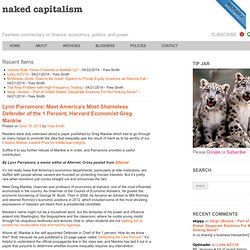
Suffice it to say further ridicule of Mankiw is in order, and Parramore provides a useful contribution. By Lynn Parramore, a senior editor at Alternet. Cross posted from Alternet It’s not really news that America’s economics departments, particularly at elite institutions, are stuffed with people whose careers are founded on protecting monied interests. The Questionable Record of Neoliberalism. Now, I suppose, is as appropriate a time as any to discuss the policies generally known as neoliberalism/free market economics: tax and spending cuts, union busting, deregulation, privatisation and free trade, and how they have fared in practice.
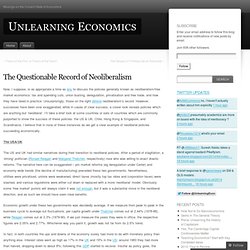
Ineteconomics.org/sites/inet.civicactions.net/files/kay-john-state-of-economics-v11.pdf. "The Illuminati Were Amateurs" - Matt Taibbi Explains How "Everything Is Rigged" From Matt Taibbi of Rolling Stone, back to his best, most floral of writing styles: Everything Is Rigged: The Biggest Price-Fixing Scandal Ever The Illuminati were amateurs.
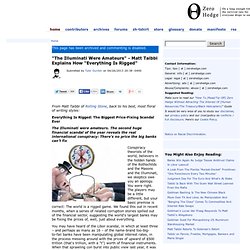
The second huge financial scandal of the year reveals the real international conspiracy: There's no price the big banks can't fix. A Unifying Principle for Economics? Commenter Dan thinks economics has not yet found its watershed moment:
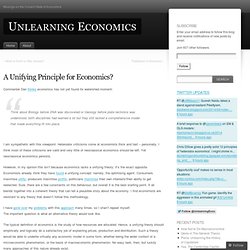
Hayek, Friedman, and the Illusions of Conservative Economics. The Great Persuasion: Reinventing Free Markets since the DepressionBy Angus Burgin (Harvard University Press, 303 pp., $29.95) JUST AS I WAS wondering how to start this review, along came the Sunday New York Times Magazinewith a short article by Adam Davidson with the title “Made in Austria: Will Friedrich von Hayek be the Tea Party’s Karl Marx?”

One Tea Party activist reported that his group’s goal is to fill Congress with Hayekians. This project is unlikely to go smoothly if the price of admission includes an extensive reading of Hayek’s writings. As Davidson remarks, some of Hayek’s ideas would not go down well at all with the American far right: among them is a willingness to entertain a national health care program, and even a state-provided basic income for the poor. Washington's jaw drops at possibility of AIG lawsuit - Ben White and Anna Palmer. Remember when AIG took a $182 billion bailout only to turn around and hand out seven-figure bonuses to the same guys who tanked their company?

Grab the pitchforks — it gets better. Continue Reading AIG's 'Thank You America' ad Today the insurance organization considered whether to join a lawsuit against the U.S. government over the terms of the bailout — saying the deal that saved the company cheated shareholders. (Also on POLITICO: AIG ad thanks taxpayers for bailout) After a media backlash, the board decided against joining the suit, The Associated Press reports. Treasury Secretary Timothy Geithner — who faced calls for his firing over the AIG bailout — and Federal Reserve Chairman Ben Bernanke were furious when AIG was considering the move, according to one Democratic lawyer.
Heirs of Mao’s Comrades Rise as New Capitalist Nobility. Lying in a Beijing military hospital in 1990, General Wang Zhen told a visitor he felt betrayed.
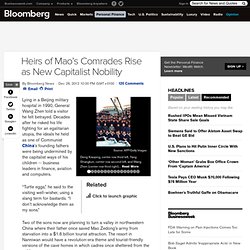
US 'to sue' Standard & Poor's over ratings - USA. Yes, Virginia, the Rich Continue to Get Richer: the Top 1% Got 121% of Income Gains Since 2009. Yes, sports fans, you read that headline correctly.
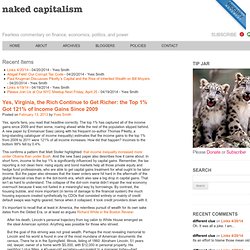
The top 1% has captured all of the income gains since 2009 and then some, roaring ahead while the rest of the population slipped behind. A new paper by Emmanuel Saez (along with his frequent co-author Thomas Piketty, a long-standing cataloguer of income inequality) estimates that the income gains to the top 1% from 2009 to 2011 were 121% of all income increases. How did that happen?
Incomes to the bottom 99% fell by 0.4%. This confirms a pattern that Matt Stoller highlighted: that income inequality increased more under Obama than under Bush. It’s important to recall that at least in America, the relentless pursuit of wealth for its own sake dates from the Gilded Era, or at least so argues Richard White in the Boston Review: After his death, Lincoln’s personal trajectory from log cabin to White House emerged as the ideal American symbol.
Hayek, Friedman, And The Illusions Of Conservative Economics. The Great Persuasion: Reinventing Free Markets since the DepressionBy Angus Burgin (Harvard University Press, 303 pp., $29.95) JUST AS I WAS wondering how to start this review, along came the Sunday New York Times Magazinewith a short article by Adam Davidson with the title “Made in Austria: Will Friedrich von Hayek be the Tea Party’s Karl Marx?” One Tea Party activist reported that his group’s goal is to fill Congress with Hayekians. This project is unlikely to go smoothly if the price of admission includes an extensive reading of Hayek’s writings. As Davidson remarks, some of Hayek’s ideas would not go down well at all with the American far right: among them is a willingness to entertain a national health care program, and even a state-provided basic income for the poor.
Wolf Richter: The EU Bailout Oligarchy Issues A Report About Itself. By Wolf Richter, San Francisco based executive, entrepreneur, start up specialist, and author, with extensive international work experience. Cross posted from Testosterone Pit. On Friday before Christmas when nobody was paying attention, when people were elbowing their way through department stores or heading out for vacation, the European Commission issued its report on bank bailouts in the European Union—a dry document with mind-boggling numbers that left out the most important fact.
The misnamed “2012 State Aid Scoreboard“ provided a sobering number—misnamed because it covered the period from October 2008 through December 2011, and not 2012. Currencies: The weak shall inherit the earth. Part XIII: Alternatives to the EMH. The Efficient Markets Hypothesis is pretty much indefensible. This column will change your life: self-perception theory. What have the economists ever done for us? There is a long list of culprits when it comes to assigning blame for the financial crisis. This column argues economists are among the guilty, having succumbed to an intellectual virus of theory-induced blindness. Economic history: Muddled models.